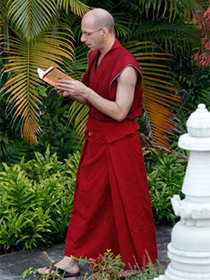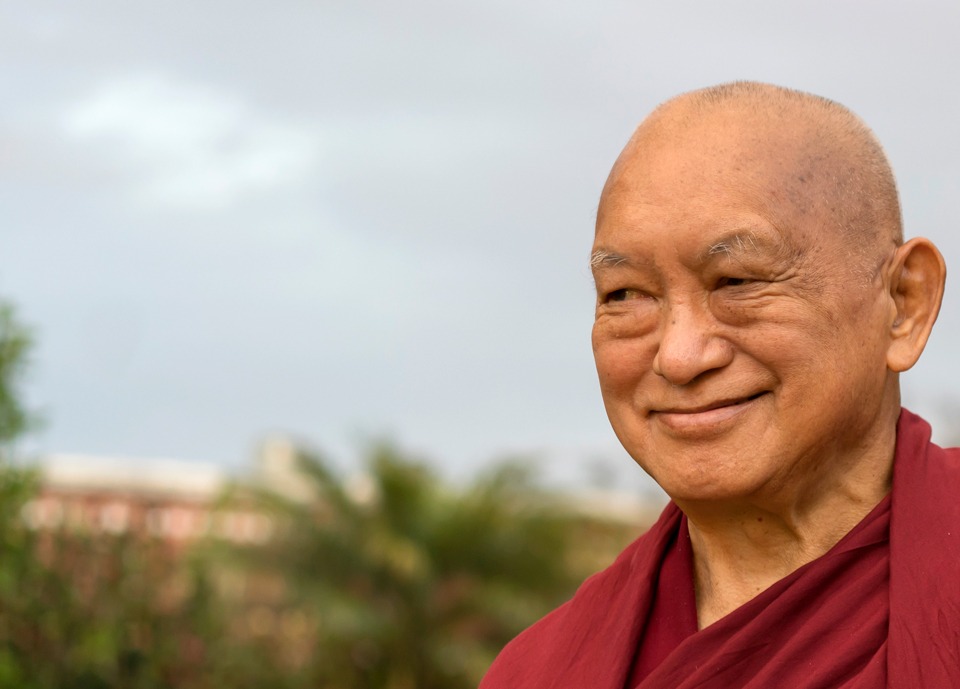- Home
- FPMT Homepage
Foundation for the Preservation of the Mahayana Tradition
The FPMT is an organization devoted to preserving and spreading Mahayana Buddhism worldwide by creating opportunities to listen, reflect, meditate, practice and actualize the unmistaken teachings of the Buddha and based on that experience spreading the Dharma to sentient beings. We provide integrated education through which people’s minds and hearts can be transformed into their highest potential for the benefit of others, inspired by an attitude of universal responsibility and service. We are committed to creating harmonious environments and helping all beings develop their full potential of infinite wisdom and compassion. Our organization is based on the Buddhist tradition of Lama Tsongkhapa of Tibet as taught to us by our founders Lama Thubten Yeshe and Lama Thubten Zopa Rinpoche.
- Willkommen
Die Stiftung zur Erhaltung der Mahayana Tradition (FPMT) ist eine Organisation, die sich weltweit für die Erhaltung und Verbreitung des Mahayana-Buddhismus einsetzt, indem sie Möglichkeiten schafft, den makellosen Lehren des Buddha zuzuhören, über sie zur reflektieren und zu meditieren und auf der Grundlage dieser Erfahrung das Dharma unter den Lebewesen zu verbreiten.
Wir bieten integrierte Schulungswege an, durch denen der Geist und das Herz der Menschen in ihr höchstes Potential verwandelt werden zum Wohl der anderen – inspiriert durch eine Haltung der universellen Verantwortung und dem Wunsch zu dienen. Wir haben uns verpflichtet, harmonische Umgebungen zu schaffen und allen Wesen zu helfen, ihr volles Potenzial unendlicher Weisheit und grenzenlosen Mitgefühls zu verwirklichen.
Unsere Organisation basiert auf der buddhistischen Tradition von Lama Tsongkhapa von Tibet, so wie sie uns von unseren Gründern Lama Thubten Yeshe und Lama Thubten Zopa Rinpoche gelehrt wird.
- Bienvenidos
La Fundación para la preservación de la tradición Mahayana (FPMT) es una organización que se dedica a preservar y difundir el budismo Mahayana en todo el mundo, creando oportunidades para escuchar, reflexionar, meditar, practicar y actualizar las enseñanzas inconfundibles de Buda y en base a esa experiencia difundir el Dharma a los seres.
Proporcionamos una educación integrada a través de la cual las mentes y los corazones de las personas se pueden transformar en su mayor potencial para el beneficio de los demás, inspirados por una actitud de responsabilidad y servicio universales. Estamos comprometidos a crear ambientes armoniosos y ayudar a todos los seres a desarrollar todo su potencial de infinita sabiduría y compasión.
Nuestra organización se basa en la tradición budista de Lama Tsongkhapa del Tíbet como nos lo enseñaron nuestros fundadores Lama Thubten Yeshe y Lama Zopa Rinpoche.
A continuación puede ver una lista de los centros y sus páginas web en su lengua preferida.
- Bienvenue
L’organisation de la FPMT a pour vocation la préservation et la diffusion du bouddhisme du mahayana dans le monde entier. Elle offre l’opportunité d’écouter, de réfléchir, de méditer, de pratiquer et de réaliser les enseignements excellents du Bouddha, pour ensuite transmettre le Dharma à tous les êtres. Nous proposons une formation intégrée grâce à laquelle le cœur et l’esprit de chacun peuvent accomplir leur potentiel le plus élevé pour le bien d’autrui, inspirés par le sens du service et une responsabilité universelle. Nous nous engageons à créer un environnement harmonieux et à aider tous les êtres à épanouir leur potentiel illimité de compassion et de sagesse. Notre organisation s’appuie sur la tradition guéloukpa de Lama Tsongkhapa du Tibet, telle qu’elle a été enseignée par nos fondateurs Lama Thoubtèn Yéshé et Lama Zopa Rinpoché.
Visitez le site de notre Editions Mahayana pour les traductions, conseils et nouvelles du Bureau international en français.
Voici une liste de centres et de leurs sites dans votre langue préférée
- Benvenuto
L’FPMT è un organizzazione il cui scopo è preservare e diffondere il Buddhismo Mahayana nel mondo, creando occasioni di ascolto, riflessione, meditazione e pratica dei perfetti insegnamenti del Buddha, al fine di attualizzare e diffondere il Dharma fra tutti gli esseri senzienti.
Offriamo un’educazione integrata, che può trasformare la mente e i cuori delle persone nel loro massimo potenziale, per il beneficio di tutti gli esseri, ispirati da un’attitudine di responsabilità universale e di servizio.
Il nostro obiettivo è quello di creare contesti armoniosi e aiutare tutti gli esseri a sviluppare in modo completo le proprie potenzialità di infinita saggezza e compassione.
La nostra organizzazione si basa sulla tradizione buddhista di Lama Tsongkhapa del Tibet, così come ci è stata insegnata dai nostri fondatori Lama Thubten Yeshe e Lama Zopa Rinpoche.
Di seguito potete trovare un elenco dei centri e dei loro siti nella lingua da voi prescelta.
- 欢迎 / 歡迎
简体中文
“护持大乘法脉基金会”( 英文简称:FPMT。全名:Foundation for the Preservation of the Mahayana Tradition) 是一个致力于护持和弘扬大乘佛法的国际佛教组织。我们提供听闻,思维,禅修,修行和实证佛陀无误教法的机会,以便让一切众生都能够享受佛法的指引和滋润。
我们全力创造和谐融洽的环境, 为人们提供解行并重的完整佛法教育,以便启发内在的环宇悲心及责任心,并开发内心所蕴藏的巨大潜能 — 无限的智慧与悲心 — 以便利益和服务一切有情。
FPMT的创办人是图腾耶喜喇嘛和喇嘛梭巴仁波切。我们所修习的是由两位上师所教导的,西藏喀巴大师的佛法传承。
繁體中文
護持大乘法脈基金會”( 英文簡稱:FPMT。全名:Found
ation for the Preservation of the Mahayana Tradition ) 是一個致力於護持和弘揚大乘佛法的國際佛教組織。我們提供聽聞, 思維,禪修,修行和實證佛陀無誤教法的機會,以便讓一切眾生都能 夠享受佛法的指引和滋潤。 我們全力創造和諧融洽的環境,
為人們提供解行並重的完整佛法教育,以便啟發內在的環宇悲心及責 任心,並開發內心所蘊藏的巨大潛能 — 無限的智慧與悲心 – – 以便利益和服務一切有情。 FPMT的創辦人是圖騰耶喜喇嘛和喇嘛梭巴仁波切。
我們所修習的是由兩位上師所教導的,西藏喀巴大師的佛法傳承。 察看道场信息:
- FPMT Homepage
- News/Media
-
- Study & Practice
-
-
- About FPMT Education Services
- Latest News
- Programs
- New to Buddhism?
- Buddhist Mind Science: Activating Your Potential
- Heart Advice for Death and Dying
- Discovering Buddhism
- Living in the Path
- Exploring Buddhism
- FPMT Basic Program
- FPMT Masters Program
- FPMT In-Depth Meditation Training
- Maitripa College
- Lotsawa Rinchen Zangpo Translator Program
- Universal Education for Compassion & Wisdom
- Online Learning Center
-
- Prayers & Practice Materials
- Overview of Prayers & Practices
- Full Catalogue of Prayers & Practice Materials
- Explore Popular Topics
- Benefiting Animals
- Chenrezig Resources
- Death & Dying Resources
- Lama Chopa (Guru Puja)
- Lama Zopa Rinpoche: Compendium of Precious Instructions
- Lama Zopa Rinpoche: Life Practice Advice
- Lama Zopa Rinpoche Practice Series
- Lamrim Resources
- Mantras
- Prayer Book Updates
- Purification Practices
- Sutras
- Thought Transformation (Lojong)
- Audio Materials
- Dharma Dates - Tibetan Calendar
- Translation Services
- Publishing Services
- Ways to Offer Support
- Prayers & Practice Materials
-
- Teachings and Advice
- Find Teachings and Advice
- Lama Zopa Rinpoche Advice Page
- Lama Zopa Rinpoche: Compendium of Precious Instructions
- Lama Zopa Rinpoche Video Teachings
- ༧སྐྱབས་རྗེ་བཟོད་པ་རིན་པོ་ཆེ་མཆོག་ནས་སྩལ་བའི་བཀའ་སློབ་བརྙན་འཕྲིན།
- Podcasts
- Lama Yeshe Wisdom Archive
- Buddhism FAQ
- Dharma for Young People
- Resources on Holy Objects
- Teachings and Advice
-
-
*If a menu item has a submenu clicking once will expand the menu clicking twice will open the page.
-
-
- Centers
-
- Teachers
-
- Projects
-
-
-
-
*If a menu item has a submenu clicking once will expand the menu clicking twice will open the page.
-
-
- FPMT
-
-
-
-
-
The most happy thing in my life, most fulfilling thing is to work for and to benefit sentient beings. Even just the mere thought to cause happiness to sentient beings, to benefit them, to free them from suffering is the BEST offering to all the buddhas and bodhisattvas. This is the best offering, the best puja; this is what pleases their holy mind most.
Lama Zopa Rinpoche
-
-
-
- Shop
-
-
-
The Foundation Store is FPMT’s online shop and features a vast selection of Buddhist study and practice materials written or recommended by our lineage gurus. These items include homestudy programs, prayers and practices in PDF or eBook format, materials for children, and other resources to support practitioners.
Items displayed in the shop are made available for Dharma practice and educational purposes, and never for the purpose of profiting from their sale. Please read FPMT Foundation Store Policy Regarding Dharma Items for more information.
-
-
Lama Zopa Rinpoche News and Advice
7
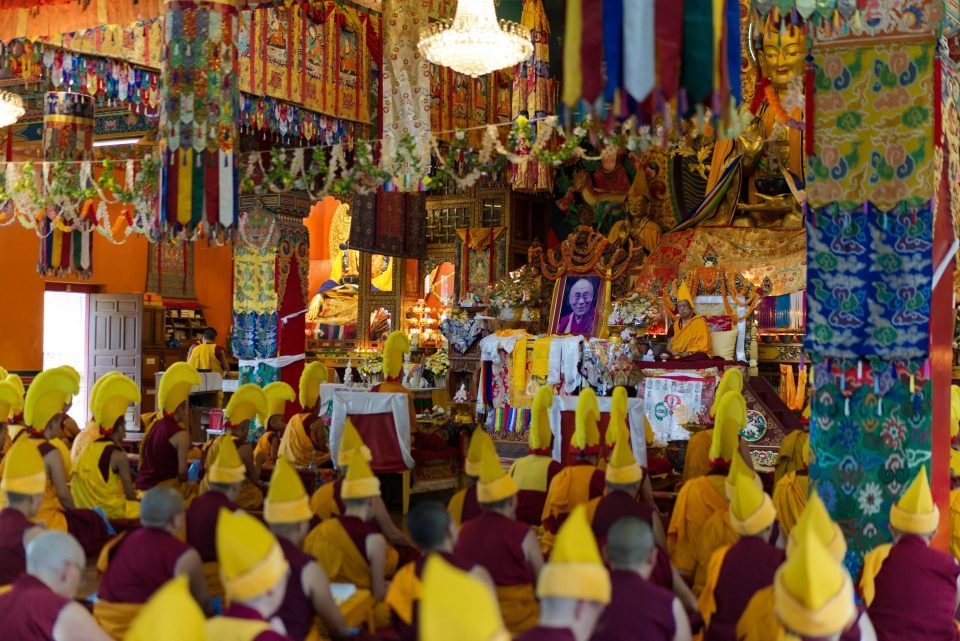
Special White Tara long life puja offered to Lama Zopa Rinpoche at Kopan Monastery, July 4, 2020. Photo by Ven. Lobsang Sherab.
On July 4, under the direction and guidance of Rangjung Neljorma Khadro Namsel Drönme (Khadro-la), a special White Tara long life puja was offered to Lama Zopa Rinpoche at Kopan Monastery, Nepal, with Khen Rinpoche Geshe Chonyi and about one hundred senior monks from the monastery and twenty nuns from the nunnery. Attendance at this puja was limited due to the current lockdown situation in Nepal.
For three days prior to the actual puja, Khadro-la, with the help of six geshes, Khen Rinpoche Geshe Chonyi, and about one hundred senior geshes and monks from Kopan Monastery, did special preparatory practices in the Kopan gompa for many hours. This was part of the White Tara long life puja, which comes from His Holiness Zong Rinpoche and is a very powerful puja from the lower tantra.
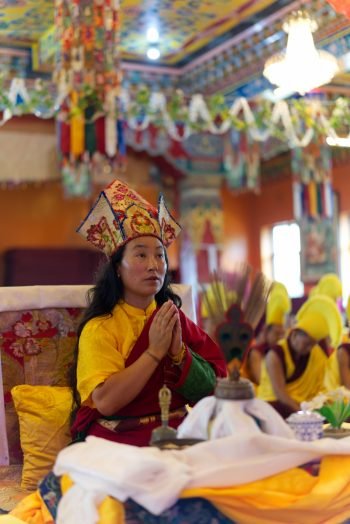
Khadro-la offering the special White Tara long life puja to Lama Zopa Rinpoche, July 4, 2020. Photo by Ven. Lobsang Sherab.
FPMT, through the Long Life Puja Fund, and Kopan Monastery sponsored this entire puja. All the extensive preparations were kindly taken care of by Kopan.
This particular long life puja was offered because Ven. Roger Kunsang had checked with Khadro-la about Rinpoche’s health and long life for the upcoming year, which is customary for him to do. Khadro-la indicated there were some obstacles to Rinpoche’s health and long life and this special long life puja was needed. In addition, Khadro-la advised on the need for three to four Most Secret Hayagriva tsog kong pujas to be offered at Kopan Monastery before the end of this year. One of these pujas has already been completed—this is a very extensive puja that takes most of an entire day, about fourteen hours, to offer.
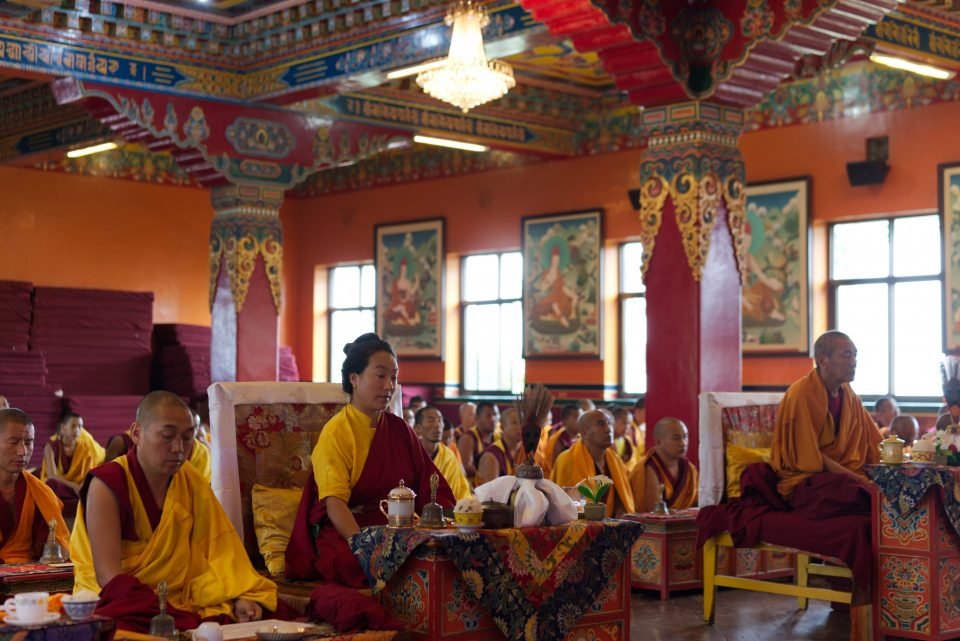
Khadro-la leading preparations the day prior to the long life puja. 3.5 days of preparations were needed. Photo by Ven. Lobsang Sherab.
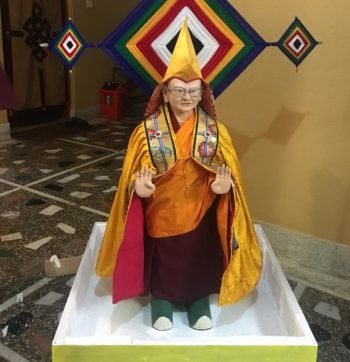
Large effigy of Lama Zopa Rinpoche made for the special long life puja by Kopan Lama Gyupas. Photo by Ven. Roger Kunsang.
Khadro-la advised that the preparation for this long life puja needed to last at least three days to make it most powerful. During the preparation there was a large effigy of Rinpoche created by the Kopan Lama Gyupas with hand-made robes, hat, and glasses. The effigy was then taken out during the puja.
On the morning of the puja, further preparation occurred until Rinpoche was invited down to the gompa by Khadro-la and Khen Rinpoche Geshe Chonyi.
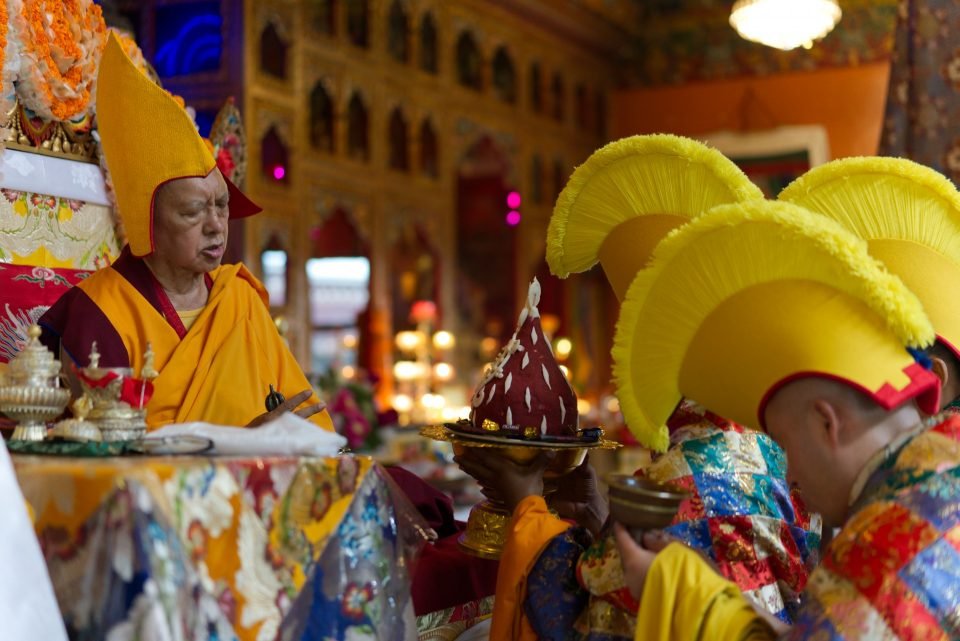
Offering of tsog during the White Tara long life puja. Photo by Ven. Lobsang Sherab.
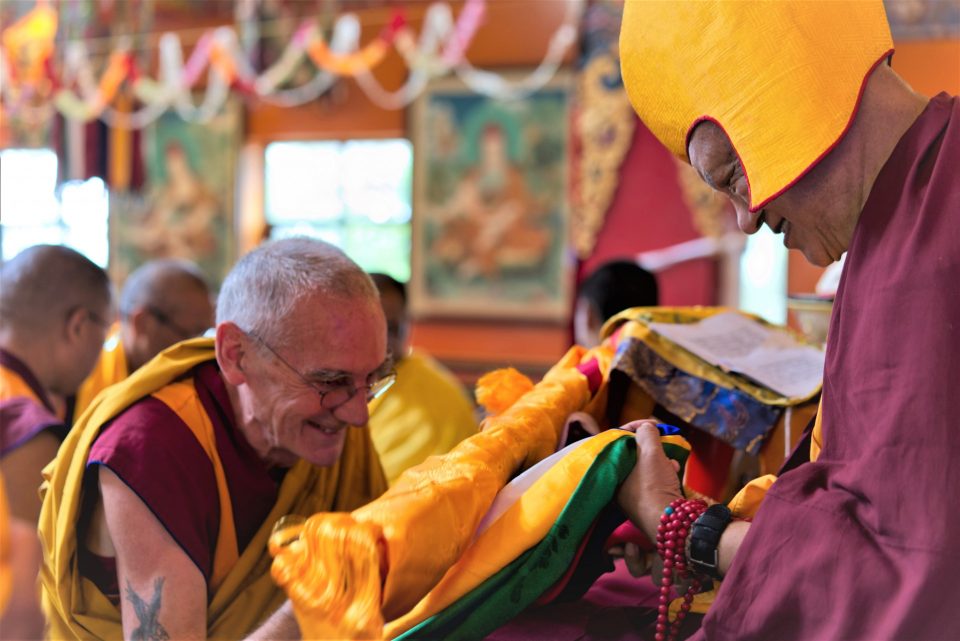
Thousand-Arm Chenrezig thangka offered by Ven. Roger Kunsang to Lama Zopa Rinpoche during the White Tara long life puja.
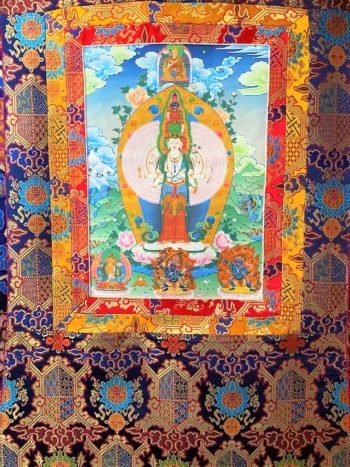
Thousand-Arm Chenrezig thangka offered to Lama Zopa Rinpoche during the White Tara long life puja. Photo by Ven. Roger Kunsang.
One very special offering that was made to Rinpoche during the puja was a new Thousand-Arm Chenrezig thangka to replace the one that Rinpoche carries with him everywhere. Ven. Roger sponsored the thangka on behalf of the organization and arranged for it to be painted about a year ago. Throughout the process Ven. Roger checked the art, quality and type of brocade, and other details with Rinpoche. Rinpoche was very pleased with the art.
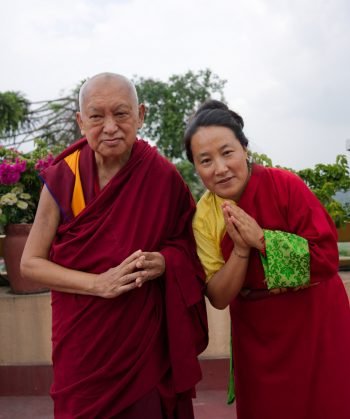
Lama Zopa Rinpoche and Khadro-la, Kopan Monastery, July 1, 2020. Photo by Ven. Lobsang Sherab.
Following the long life puja Rinpoche and Khadro-la concluded that it was important to also offer Lama Chopa with tsog, starting with Calling the Guru from Afar. This lasted into the early evening.
Every day during the preparation period guided by Khadro-la, Rinpoche and Khadro-la had lunch together, discussing many important subjects. One item discussed at length was the four to six large fire pujas that Khadro-la had advised to do at specific holy places around Kathmandu Valley. These fire pujas will be arranged by different Nyingma, Kagyu, and Gelug monasteries, including Kopan Monastery. The fire pujas have to be done in different directions and happen simultaneously and are done to help subdue the effects of COVID-19 experienced in Nepal and around the world. These pujas will happen once permission is granted at the various locations; the delays have been due to the situation of lockdown.
Each morning during the preparations, Khadro-la visited Rinpoche for thirty minutes, discussing different signs or indications that she received the night before.
The long life puja itself was very powerful and successful. Rinpoche was very happy and also Khadro-la seemed very pleased.
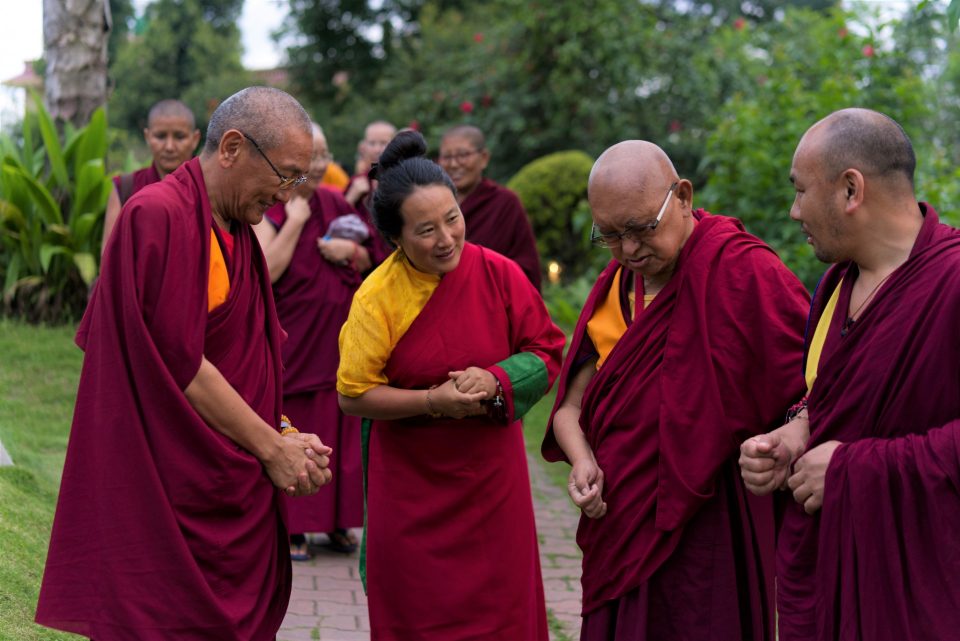
Following the long life puja Khen Rinpoche Geshe Chonyi, Khadro-la and Rinpoche walked in the gardens of Kopan Monastery. Photo by Ven. Lobsang Sherab.
On behalf of the entire FPMT organization, we offer the most heartfelt thanks to Khadro-la for taking care of Rinpoche in this way, guiding and offering the entire long life puja so carefully with so much preparation, as well as advising what other pujas are needed. We also want to take this opportunity to thank Ven. Roger Kunsang for offering tireless service to Rinpoche for thirty-five years and for making sure all of these important things happen.
Tremendous thanks to all the centers and students who support the Long Life Puja Fund—please rejoice that your offerings helped sponsor this puja.
Heartfelt thanks are also offered to Kopan Monastery for helping to offer this puja so successfully with so many prayers and preparations.
The Long Life Puja Fund always contributes to long life pujas offered to Lama Zopa Rinpoche. You can also learn about the many Charitable Projects of FPMT and discover the many ways the various funds and projects are benefiting others.
You can watch the video series Lama Zopa Rinpoche’s Teachings on Thought Transformation during the Time of COVID-19 and find links to videos in translation, transcripts, MP3s, additional practice advice, and more:
https://fpmt.org/fpmt/announcements/resources-for-coronavirus-pandemic/advice-from-lama-zopa-rinpoche-for-coronavirus/
- Tagged: khandro kunga bhuma, kopan monastery, lama zopa rinpoche long life puja fund, long life puja fund
6
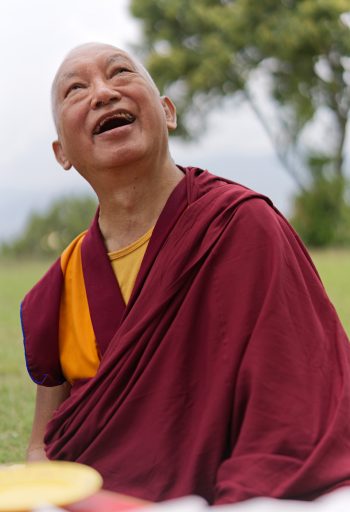
Lama Zopa Rinpoche at Kopan Monastery, Nepal, May 2020. Photo by Ven. Lobsang Sherab.
Lama Zopa Rinpoche continues his video teachings on thought transformation from Kopan Monastery in Nepal. Here is a summary of the most recent teaching:
Lama Zopa Rinpoche begins this teaching explaining that thought transformation (lojong) is utilizing unfavorable or undesirable situations on the path to enlightenment. This isn’t done for temporary happiness of a few minutes, then you go back to the problems of life, or even for liberation from samsara. You utilize problems for peerless happiness, full enlightenment—the total cessation of obscurations and the completion of realizations so you can lead all sentient being there.
Since beginningless rebirths we have lived life controlled by our enemies: desire, anger, ignorance, self-cherishing thoughts, and the root of samsara—the ignorance holding the “I as real.
We have experienced the six-realm sufferings since beginningless rebirths. Whatever we see—insects, animals, people suffering—we have gone through that. We don’t remember. But just like we don’t remember what we ate or said yesterday, we don’t remember our previous rebirths due to ignorance, pollution. No level of education or amount of money can save you from the lower realms if you don’t purify your negative karma before you die. Only good karma from practicing loving-kindness, compassion, and bodhichitta can bring you enjoyments in your next life.
Even without devotion, you collect numberless merits just by seeing a holy object. By making offerings to a holy object, you won’t be reborn in the lower realms for 840,000,000 eons. However, people who have the opportunity to make offerings are often lazy and distracted by life, which is like throwing a diamond into the garbage.
Whatever vow you take with bodhichitta benefits every single sentient being, no one is left out. This is very beautiful—no matter the problems that beings experience—wars, famine, diseases, etc.,—every vow you keep is for everyone. The merit of keeping one vow for one day is far greater than making extensive offerings to billions of buddhas. Your human rebirth is so precious because you can use it to keep even one vow for one day.
The basis of all qualities is keeping pure morality. You must cherish and protect this. This is the root of Buddha’s teaching. Starting with the five precepts through the vinaya, keeping vows protects and preserves your morality. Without a bhikshu holding vinaya there is no teaching of the Buddha. This is why monasteries and nunneries are so important and why we have so many Buddhist countries. If you don’t control your mind by living in vows, your mind brings you the worst, heaviest suffering. However, by remembering your morality and keeping vows, you have no fear and all the virtue comes into your hands.
Rinpoche concludes by continuing to offer the oral transmission of Sutra of Great Liberation.
We invite you to go deeper into the topics presented here, plus many others, by watching Rinpoche’s video and reading the full transcript of Rinpoche’s teaching.
Watch Lama Zopa Rinpoche’s teaching “This Perfect Human Body Is So Precious Because You Can Use It to Keep Even One Vow”:
https://youtu.be/gdJHUxaTW9o
- Read the transcript of Rinpoche’s teaching
- Dedication verses for COVID-19 Crisis Teachings
Watch more from the video series Lama Zopa Rinpoche’s Teachings on Thought Transformation during the Time of COVID-19 and find links to videos in translation, transcripts, MP3s, additional practice advice, and more:
https://fpmt.org/fpmt/announcements/resources-for-coronavirus-pandemic/advice-from-lama-zopa-rinpoche-for-coronavirus/
Practice advice from our teachers, Dharma study-from-home opportunities, and more can be found on the page “Resources for the Coronavirus Pandemic.”
Lama Zopa Rinpoche is the spiritual director of the Foundation for the Preservation of Mahayana Tradition (FPMT), a Tibetan Buddhist organization dedicated to the transmission of the Mahayana Buddhist tradition and values worldwide through teaching, meditation and community service.
- Tagged: advice from lama zopa rinpoche, coronavirus, covid-19, lama zopa rinpoche thought transformation video teaching, oral transmission, sutra of great liberation, video
5
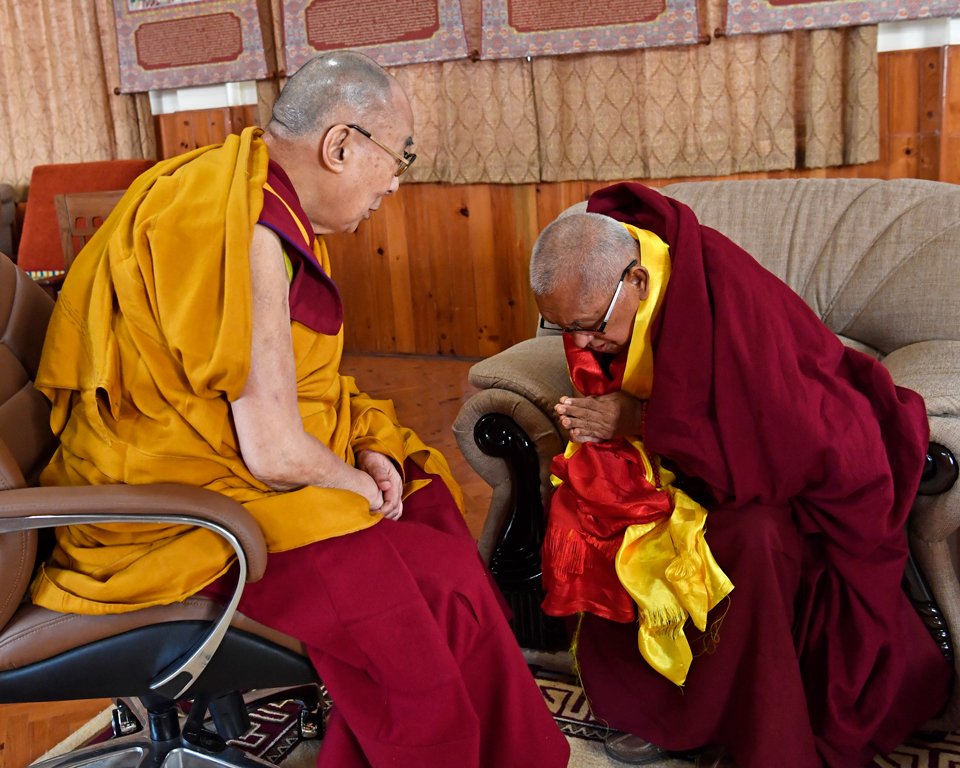
His Holiness the Dalai Lama meeting with Lama Zopa Rinpoche, Bodhgaya, India, January 2020. Photo courtesy of the Office of His Holiness the Dalai Lama.
On July 6, His Holiness the Dalai Lama’s 85th birthday is being celebrated around the world by Tibetans and an international community of students of Tibetan Buddhism. FPMT International Offices joins in the rejoicing and offers prayers for His Holiness’s excellent health and very long life!
Supporting the wishes of His Holiness is a primary aim of the FPMT organization as described in Lama Zopa Rinpoche’s Vast Vision for FPMT. Rinpoche has explained that “[I would like] for FPMT to offer service to His Holiness the Dalai Lama as much as possible and to be able to fulfill His Holiness’ wishes. This is the highest priority for the organization.” Rinpoche has further said, “This is the quickest and most vast way of benefiting sentient beings.”
Since its inception, FPMT has turned to His Holiness the Dalai Lama for inspiration and guidance and attempted to promote and actualize His Holiness’ vision as much as possible and to create the cause for His Holiness’ long life. This includes offering or being part of offering a long life puja to His Holiness when possible. Rinpoche has also given extensive advice on prayers and practices to be done on His Holiness’s birthday and recently arranged 1000 Buddhas to be offered to His Holiness the Dalai Lama on behalf of FPMT organization.
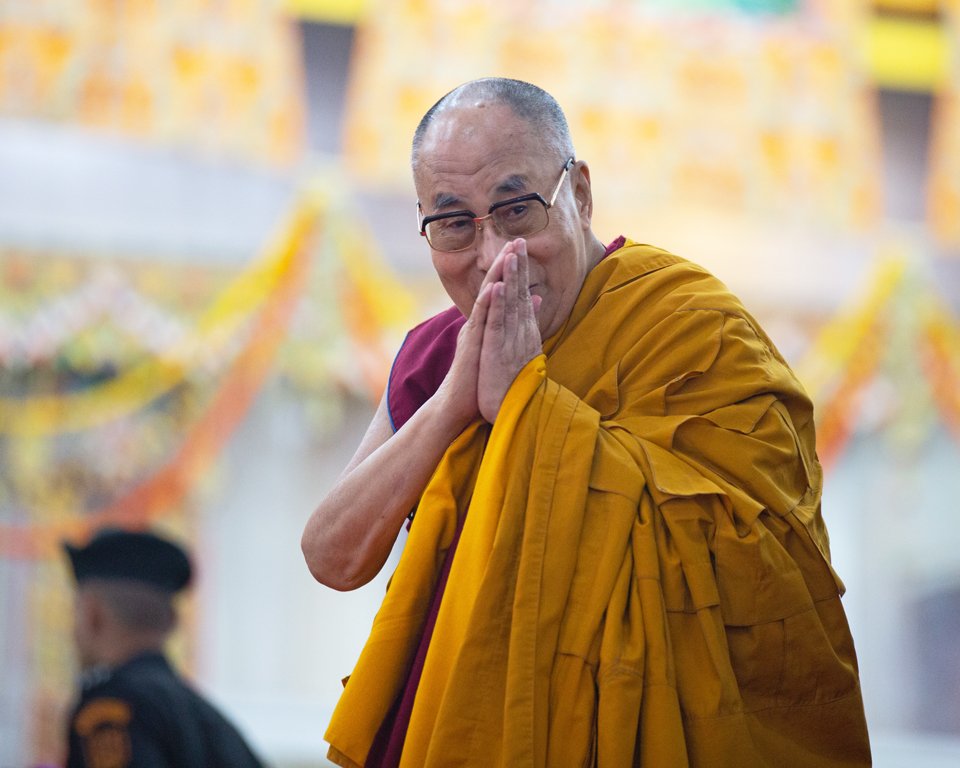
His Holiness the Dalai Lama, India, January 2017. Photo by Neal Patrick.
As the spiritual guide for six million Tibetans, as Lama Zopa Rinpoche’s guru, as a recipient of the Noble Peace Prize, and as a promoter of each individual’s universal responsibility toward humankind and the environment, His Holiness serves as a living symbol for world peace.
At 85 years, His Holiness continues to be relevant and tuned into the needs of people around the world, engaging in discussions with young people and participating in dialogues on the environment, science and the mind, and interfaith understanding. During the coronavirus pandemic, His Holiness is offering live webcasts of teachings to continue to connect with students and bring the teachings of the Buddha to the world.
His Holiness also participates in novel projects, such his new album Inner World, a collection of mantras and teachings set to music that is being releases on his birthday this year. (The tracks “Compassion” and “One of My Favorite Prayers” are available as videos.) The album was created by long-time students of His Holiness wishing to bring benefit to people. Proceeds from the album will be donated to projects carrying out His Holiness’s vision.
For more on His Holiness the Dalai Lama and his beneficial activities, please visit DalaiLama.com.
Lama Zopa Rinpoche is the spiritual director of the Foundation for the Preservation of Mahayana Tradition (FPMT), a Tibetan Buddhist organization dedicated to the transmission of the Mahayana Buddhist tradition and values worldwide through teaching, meditation and community service.
- Tagged: his holiness the dalai lama
3

Lama Zopa Rinpoche, Kopan Monastery, Nepal, April 2020. Photo by Ven. Lobsang Sherab.
Lama Zopa Rinpoche’s newest book, How to Face Death without Fear: A Handbook by Lama Zopa Rinpoche, was recently released by Wisdom Publications. The 400-plus page paperback book has been compiled from years of Rinpoche’s teachings and carefully edited by Ven. Robina Courtin, an FPMT registered teacher.
Students can use How to Face Death without Fear: A Handbook to help loved ones prepare for the end of their life with courage, acceptance, and a mind free of fear. Rinpoche explains how to think about death and reincarnation, how we go from one life to the next, what to do before death, in the moment itself, after the breath has stopped, and after the mind has left the body. Much of the advice included in the book can be adapted to benefit non-Buddhists and animals too.
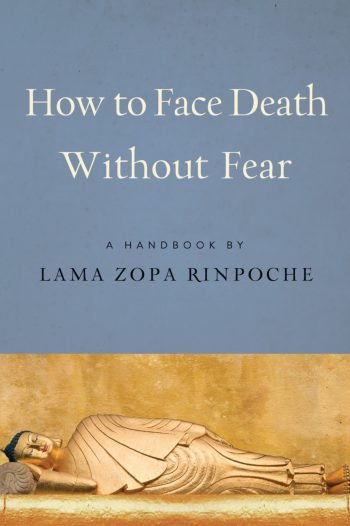
How to Face Death Without Fear: A Handbook by Lama Zopa Rinpoche.
As Rinpoche says in the book’s introduction, “When suddenly one day one of your loved ones dies and you don’t know what to do to help, you’ll feel so confused, so lost. Recently a Buddhist student of mine told me that this is what happened for her when her father died unexpectedly. That made me think that knowing how to help others at the time of death is such important education to have.”
Rinpoche provides the mantras, prayers, and meditations appropriate for each stage of the dying process. This new edition of Rinpoche’s 2017 book How to Enjoy Death makes it easy for the reader to find the right practice at the right time.
Ven. Robina Courtin explained in the preface, “Because for most of us death is a difficult thing to come to terms with—our loved one’s or our own—working out which practices to do can be daunting. Therefore Rinpoche’s actual advice, the things to do—contained in parts 3, 4, and 5, the heart of the book—have been identified as eighty-seven distinct practices, numbered and structured chronologically to help us know what to do when.”
How to Face Death without Fear: A Handbook is an invaluable resource not only for Tibetan Buddhist caregivers, hospice workers, and chaplains but for all of us.
Liberation Box, Protection Tools for a Fortunate Rebirth
The FPMT Foundation Store continues to offer the Liberation Box, which is a collection of tools to be used at the time of death assembled according to Lama Zopa Rinpoche’s advice. It contains powerful methods for ensuring a fortunate rebirth for those who have died or are in the process of dying, including a stupa, hardcopy booklets and cards, MP3 audio files, a phowa pill, and a blessed cord. The Liberation Box can compliment the practices in Rinpoche’s book How to Face Death without Fear. The Foundation Store also offers a French and Spanish hardcopy version of the Liberation Box, as well as a digital version.
For more information, visit Wisdom Publications’ page for How to Face Death without Fear: A Handbook by Lama Zopa Rinpoche:
https://wisdomexperience.org/product/how-to-face-death-without-fear/
You can also find links to many resources for time of death on FPMT.org/death.
FPMT.org and Mandala Publications brings you news of Lama Zopa Rinpoche and of activities, teachings, and events from over 160 FPMT centers, projects, and services around the globe. If you like what you read, consider becoming a Friend of FPMT, which supports our work.
1
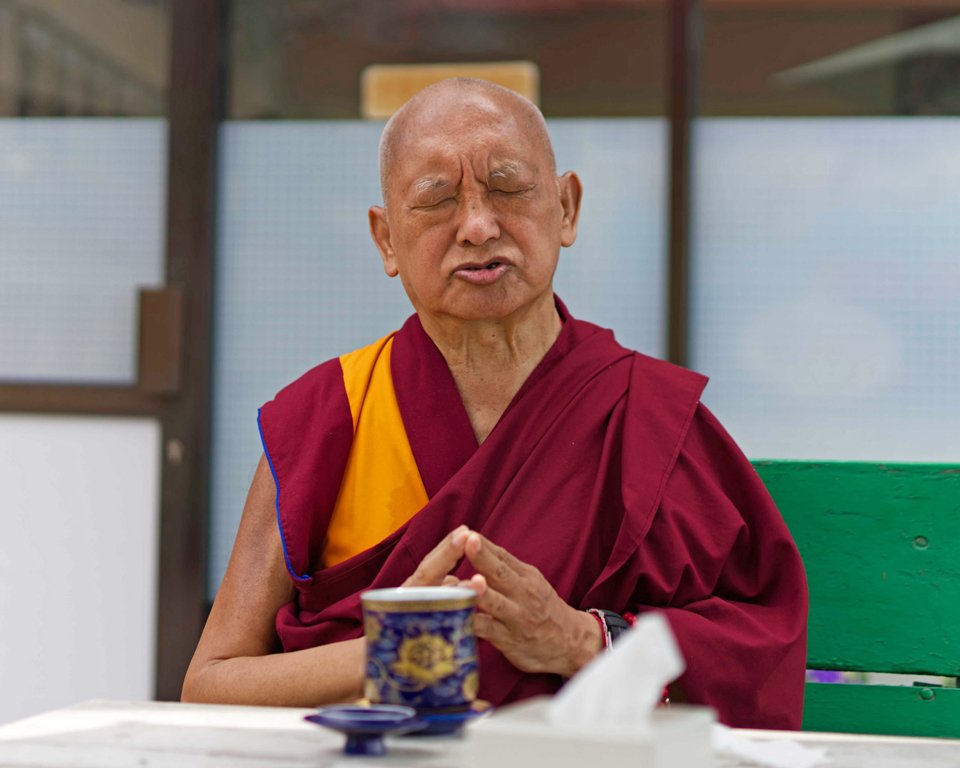
Lama Zopa Rinpoche outside the Kopan canteen, where he had tea with some monks, Kopan Monastery, June 2020. Photo by Ven. Lobsang Sherab.
Lama Zopa Rinpoche continues his video teachings on thought transformation from Kopan Monastery in Nepal. Here is a summary of the most recent teaching:
This video begins with long-time FPMT student Massimo Corona, who arrived at Kopan Monastery in 1971, explaining how he met Lama Yeshe and Lama Zopa Rinpoche. Massimo, who also served FPMT Inc. as its executive director and a member of the board of directors, helped bring FPMT to his home country, Italy. With the financial assistance of his family, Massimo was able to purchase and offer an old stone castle in Tuscany in 1977. This became the home of Istituto Lama Tzong Khapa and firmly established FPMT in continental Europe.
Lama Zopa Rinpoche begins this teaching explaining that people can misuse their precious human rebirth to create negative karma, which is like using gold to buy “kaka.” By recognizing how precious the human rebirth is, we then don’t waste it on meaningless things. Even without vows, avoiding killing, stealing, lying, etc., will help keep you from going to prison. We need to abstain from creating negative karma and have self-discipline. Even keeping one of the five lay precepts brings so much happiness to others by protecting them from being harmed by you. Taking vows is also practical. Without them, you not only waste your life, you use it to create non-virtue.
Due to ignorance, we live life with obscurations in the mind, like being in a fog without any sun, moon, or stars. The truth doesn’t exist in that kind of mind, and we follow a hallucinated life, thinking, “This is real. This is truth.” In the West, people think it isn’t possible to live a life without attachment and self-cherishing thoughts or activities. However, in the East, numberless beings have become enlightened, and there are many holy places. Buddhism has now spread to the West, but there is a shallow understanding of the teachings. People need to be willing to bear hardships, like Milarepa did, in order to practice Dharma. We need to bear hardships to overcome delusions and have realizations. Buddhism is not easy. To go deep into Buddhism, we have to dedicate our life to it and make sacrifices. The first Dharma practice is to renounce worldly concern.
Unless we have omniscience or very high clairvoyance, we aren’t able to see others’ minds and we can’t tell who is enlightened. When holy beings appear to be doing normal activities or appear ordinary, our obscured mind cannot see that they are enlightened. It is possible that someone who appears very ordinary is enlightened, and we can make many mistakes in relation to them.
When you actualize bodhichitta, you don’t do any single activity with the motivation of cherishing yourself, everything is for every other being including the numberless beings in numberless universes.
By realizing impermanence and death, you can overcome laziness and everything you do becomes holy Dharma. With the realization of impermanence, Dharma becomes easy. And then doing non-Dharma worldly things becomes difficult because you are aware of the shortcomings.
We invite you to go deeper into the topics presented here, plus many others, by watching Rinpoche’s video and reading the full transcript of Rinpoche’s teaching.
Watch Lama Zopa Rinpoche’s teaching “When You Realize Impermanence, Dharma Becomes Easy”:
https://youtu.be/WqkCy443X7I
Find more advice and video teachings by Lama Zopa Rinpoche from Kopan Monastery and also links to videos in translation, transcripts, MP3s, and more:
https://fpmt.org/fpmt/announcements/resources-for-coronavirus-pandemic/advice-from-lama-zopa-rinpoche-for-coronavirus/
Practice advice from our teachers, Dharma study-from-home opportunities, and more can be found on the page “Resources for the Coronavirus Pandemic.”
Lama Zopa Rinpoche is the spiritual director of the Foundation for the Preservation of Mahayana Tradition (FPMT), a Tibetan Buddhist organization dedicated to the transmission of the Mahayana Buddhist tradition and values worldwide through teaching, meditation and community service.
- Tagged: advice from lama zopa rinpoche, coronavirus, covid-19, lama zopa rinpoche thought transformation video teaching, massimo corona, video
27
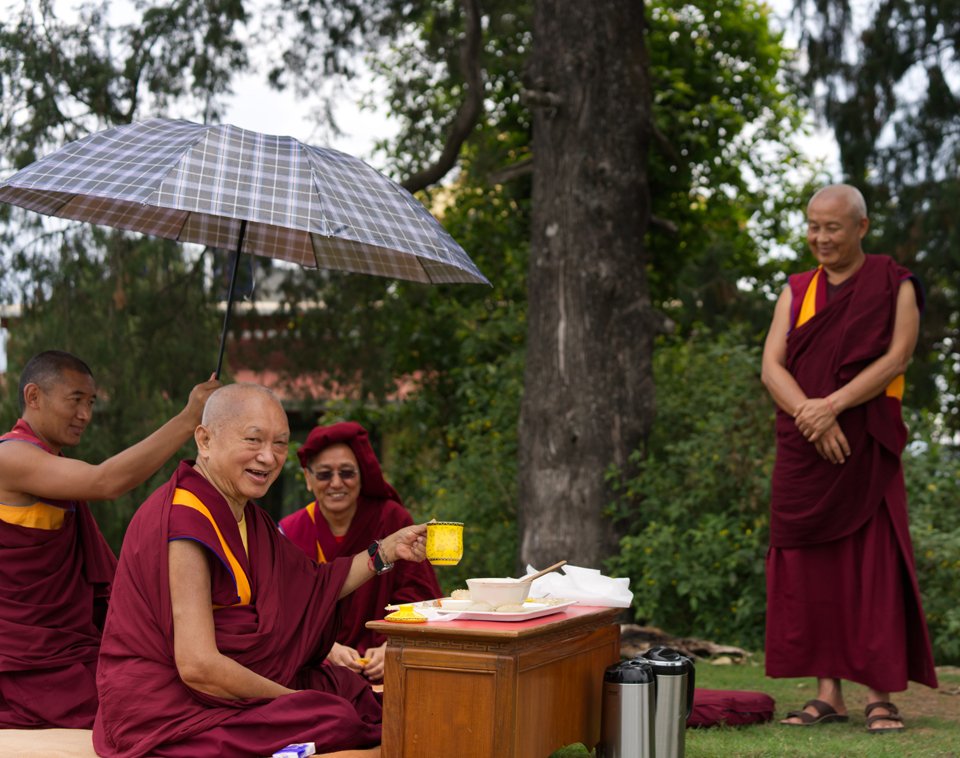
Lama Zopa Rinpoche with Khen Rinpoche Geshe Chonyi and other Kopan monks on top of Kopan Hill, Kopan Monastery, Nepal, June 2020. Photo by Ven. Lobsang Sherab.
Lama Zopa Rinpoche continues his video teachings from Kopan Monastery in Nepal. Here is a summary of the most recent teaching:
Lama Zopa Rinpoche begins this video by explaining that the subject of the teachings he has been providing from Kopan Monastery is lojong, thought transformation—transforming sufferings (including this virus) into ultimate happiness, liberation from samsara, and enlightenment so that sentient beings can achieve full enlightenment, the total cessation of obscurations and the completion of all the realizations.
Without self-discipline life is filled with so much suffering. There’s no peace and unbelievable dissatisfaction. We think these problems come from the outside, but they never do; they all come from the mind. You have to practice contentment, patience, compassion, and loving-kindness—all qualities of a good human being. Without doing this, your whole life is suffering.
Meditation is to free yourself from the oceans of samsaric suffering by ceasing and eradicating the root of samsara, which is the ignorance that holds “I” as real. How the “I” exists is that the mind focuses on the aggregates and merely imputes “I.” When the “I” appears back to you, it appears in all the wrong ways. It appears permanent, without parts, and independent. It is labeled by the mind and does not truly exist. It is a dependent arising. It is not possible for something to exist from its own side. The “I” is so extremely subtle that it is as if it doesn’t exist. The wisdom realizing that the “I” is empty of existing from its own side eradicates the ignorance that is the root of samsara. The wrong concept that believes that the “I” exists from its own side is the root of suffering. All of your suffering comes from your wrong concepts, from your mind, not from the outside.
Ignorance functions to give rise to the other delusions. Ignorance exaggerates “good” and “bad” and from that anger and attachment arise. This is all based on the object of ignorance, which is a totally wrong concept. If you follow attachment with no self-discipline, no contentment, no satisfaction, your life becomes crazy.
By taking vows (Rinpoche goes through the various levels of vows), in addition to meditation and listening to teachings, you practice self-discipline and generate so much merit.
Rinpoche concludes by continuing to offer the oral transmission of Sutra of Great Liberation.
We invite you to go deeper into the topics presented here, plus many others, by watching Rinpoche’s video and reading the full transcript of Rinpoche’s teaching.
Watch Lama Zopa Rinpoche’s teaching “Without Self Discipline, It’s Like You Throw a Bomb on Your Life”:
https://youtu.be/ClQdXk1dvdY
- Read the transcript of Rinpoche’s teaching
- Sutra of Golden Light resource page
- Recognizing the False I by Lama Zopa Rinpche
Find more advice and video teachings by Lama Zopa Rinpoche from Kopan Monastery and also links to videos in translation, transcripts, MP3s, and more:
https://fpmt.org/fpmt/announcements/resources-for-coronavirus-pandemic/advice-from-lama-zopa-rinpoche-for-coronavirus/
Practice advice from our teachers, Dharma study-from-home opportunities, and more can be found on the page “Resources for the Coronavirus Pandemic.”
Lama Zopa Rinpoche is the spiritual director of the Foundation for the Preservation of Mahayana Tradition (FPMT), a Tibetan Buddhist organization dedicated to the transmission of the Mahayana Buddhist tradition and values worldwide through teaching, meditation and community service.
- Tagged: advice from lama zopa rinpoche, coronavirus, covid-19, emptiness, golden light sutra, lama zopa rinpoche thought transformation video teaching, oral transmission, sutra of golden light, sutra of great liberation, video, vows
24
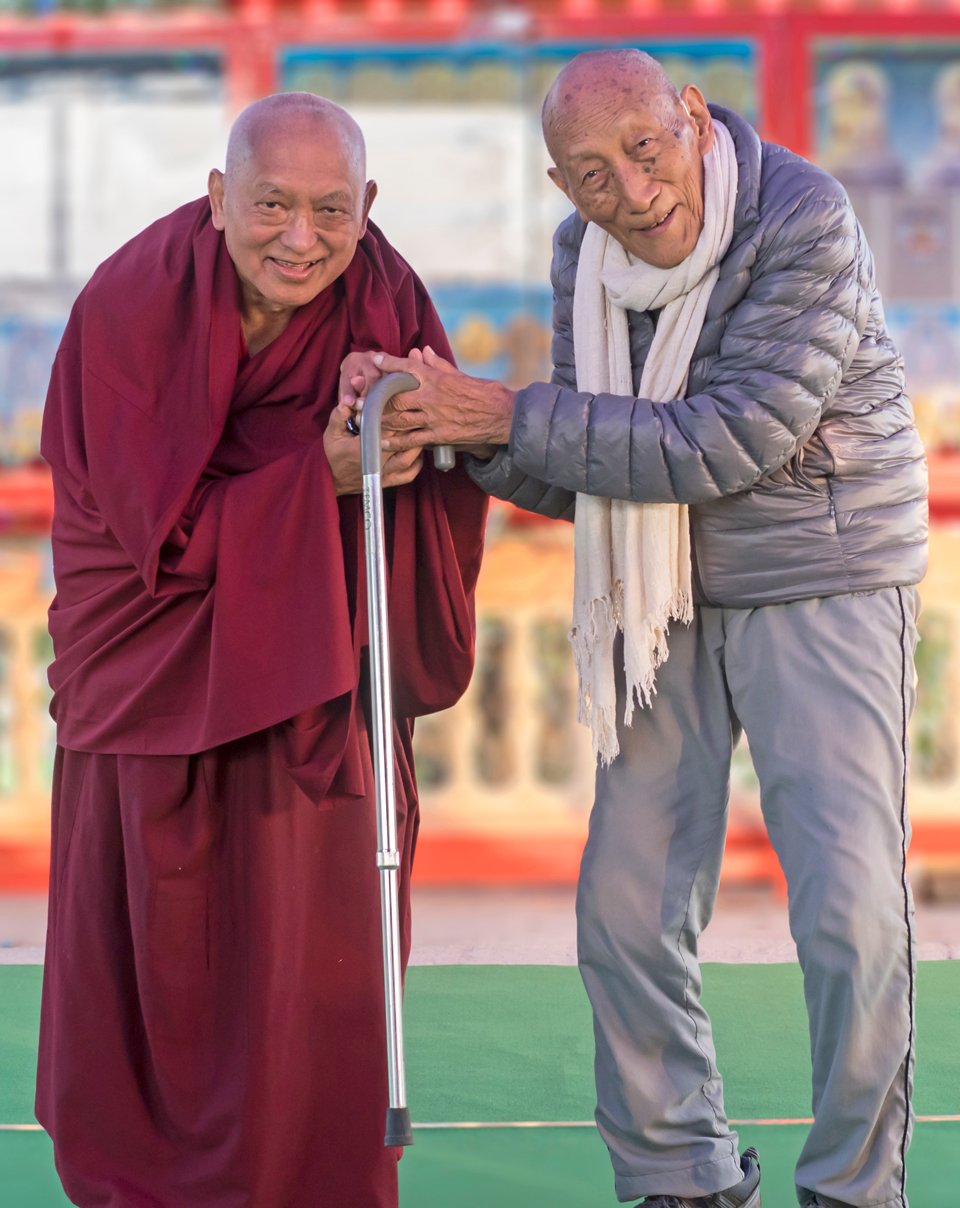
Lama Zopa Rinpoche with Khyongla Rato Rinpoche at Root Institute, India, January 2018. Photo by Ven. Lobsang Sherab.
Lama Zopa Rinpoche continues his video teachings from Kopan Monastery in Nepal. Here is a summary of the most recent teaching:
This video begins with footage of Rinpoche, which was filmed by Richard Gere, receiving the lung of the dharani Extremely Conquering from Bondage from Khyongla Rato Rinpoche at Root Institute in India.
Lama Zopa Rinpoche begins this teaching explaining that if we create the cause to be born in the lower realms and we do not purify this before death comes, we are reborn there and will have to suffer again and again until the karma finishes. As a human beings, we have total freedom to purify our negative karma, and there are many practices to do this. This precious human rebirth can end at any time, while we are doing any daily activity—we never know when we will die.
Many believe that everything that happens in one’s life is up to God, or Buddha, or somebody who has the highest power. But the question arises: If everything is up to God or Buddha, why is there suffering? Don’t they have compassion for the world? His Holiness the Dalai Lama says that the human brain is special because it can be used to analyze. We have to put in effort from our side, we have to analyze. If you just think, “Oh, God will take care,” then you can just follow all the delusions and whatever the selfish mind wants, and thus live life creating negative karma, thinking someone else more powerful will take care. In reality, we created the cause of suffering ourselves. Therefore, we have to generate the whole graduated path to enlightenment: correctly following the virtuous friend, renunciation, bodhichitta, right view, and tantra.
Rinpoche continues explaining the benefits of Sutra of Great Liberation and continues giving the oral transmission for this sutra.
Buddhism explains how to be free from suffering forever. Even if we don’t die from the virus, we will die from something else. Buddhism has so many ways to rescue us from suffering, and offers so many ways to help others. If you do get the virus, you can experience it and make it useful for sentient beings by thinking that they will receive enlightenment due to you taking on the virus. In this way, you not only utilize the virus for happiness, but for ultimate happiness, and to achieve enlightenment for the numberless sentient beings so that they can be free from oceans of samsaric suffering by you bringing them to enlightenment as well.
We invite you to go deeper into the topics presented here, plus many others, by watching Rinpoche’s video and reading the full transcript of Rinpoche’s teaching.
Watch Lama Zopa Rinpoche’s teaching “Buddhism Has So Many Ways to Rescue Us from Suffering”:
https://youtu.be/pDi16-BVzZw
- Read the transcript of Rinpoche’s teaching
- Dedication verses for COVID-19 Crisis Teachings
Find more advice and video teachings by Lama Zopa Rinpoche from Kopan Monastery and also links to videos in translation, transcripts, MP3s, and more:
https://fpmt.org/fpmt/announcements/resources-for-coronavirus-pandemic/advice-from-lama-zopa-rinpoche-for-coronavirus/
Practice advice from our teachers, Dharma study-from-home opportunities, and more can be found on the page “Resources for the Coronavirus Pandemic.”
Lama Zopa Rinpoche is the spiritual director of the Foundation for the Preservation of Mahayana Tradition (FPMT), a Tibetan Buddhist organization dedicated to the transmission of the Mahayana Buddhist tradition and values worldwide through teaching, meditation and community service.
- Tagged: advice from lama zopa rinpoche, coronavirus, covid-19, khyongla rato rinpoche, lama zopa rinpoche thought transformation video teaching, oral transmission, sutra of great liberation, video
23
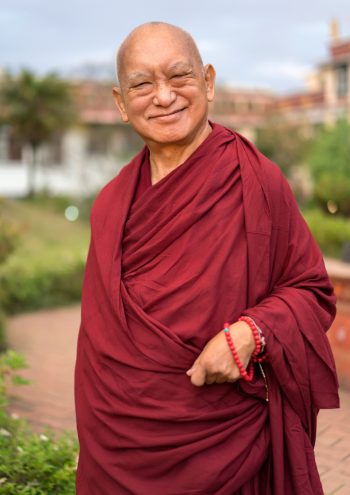
Lama Zopa Rinpoche at Kopan Monastery, Nepal, May 2020. Photo by Ven. Lobsang Sherab.
The Six Perfections: The Practice of the Bodhisattvas is a new book from Lama Zopa Rinpoche, published by Wisdom Publications in March 2020. In it, Rinpoche walks us through this key Mahayana Buddhist teaching. Here’s an excerpt from Rinpoche’s teaching on the perfection of patience:
There is nothing pleasant at all about anger. Irritation, agitation, impatience, sullenness, spite—all these sorts of negative emotions overwhelm us and refuse to give us one moment’s peace, whereas when we have patience, we have genuine peace. There is no question of which is preferable. The frustrated, unhappy mind is the fuel that can easily grow into anger. Until we have learned to overcome that anger with patience, it will destroy any happiness we have.
It’s not that anger and hatred are weak minds. With hatred our mind is incredibly focused on the object of our hatred and how to destroy it. We should turn that strength around to destroy the real enemy, focusing all our attention on what is really causing us such unhappiness—our own anger. We need to destroy it completely with patience.
We don’t have to become angry when an enemy tries to harm us or when adverse situations occur. It’s impossible to avoid problems, but when we analyze such situations, we will see that there is no reason for becoming unhappy. Unless we can generate a happy mind, how can we renounce the unhappy one? We therefore need to think well on the benefits of voluntarily accepting suffering and make a strong determination to not allow anger and frustration to arise, no matter what happens around us.
It is very easy to let a day go by without practicing patience, then a week, a month, a year. Before we know it, our whole life has gone and then, suddenly, unexpectedly, death happens and we have never developed patience in our mind, despite all the teachings we have studied and retreats we have done. At the time of death it’s too late to regret not developing patience.
What we can do now in a very practical way is to watch our mind, and the moment it is disturbed by somebody or something, by understanding the terrible effects of anger, we determine to not allow even a moment of anger to arise. We can make a plan to do this for a certain time each day and gradually increase it. If we train our mind in patience in that way, doing whatever we can to overcome any angry thought that arises, by keeping at it, change will definitely happen, year by year. Seeing how there is so much more peace now that the angry mind does not arise gives us the determination to practice patience even more. Then, thinking back on how we once would have become angry from one sharp word from a colleague at work or from the noise of branches tapping on our window disturbing our sleep, we will wonder why we ever got so angry. It is just a matter of practice.
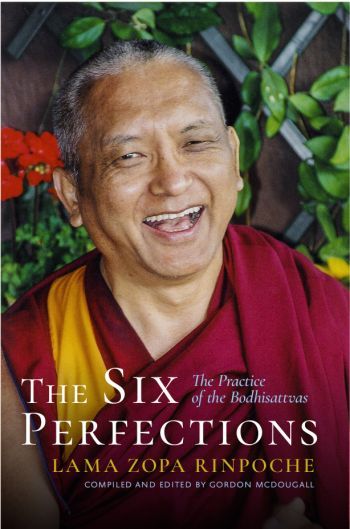
Cover of Lama Zopa Rinpoche’s book
Learn more about The Six Perfections: The Practice of the Bodhisattvas, including order information, on Wisdom Publication’s website:
https://wisdomexperience.org/product/the-six-perfections/
Find recent advice and video teachings by Lama Zopa Rinpoche from Kopan Monastery and also links to videos in translation, transcripts, MP3s, and more:
https://fpmt.org/fpmt/announcements/resources-for-coronavirus-pandemic/advice-from-lama-zopa-rinpoche-for-coronavirus/
Lama Zopa Rinpoche is the spiritual director of the Foundation for the Preservation of Mahayana Tradition (FPMT), a Tibetan Buddhist organization dedicated to the transmission of the Mahayana Buddhist tradition and values worldwide through teaching, meditation and community service.
22
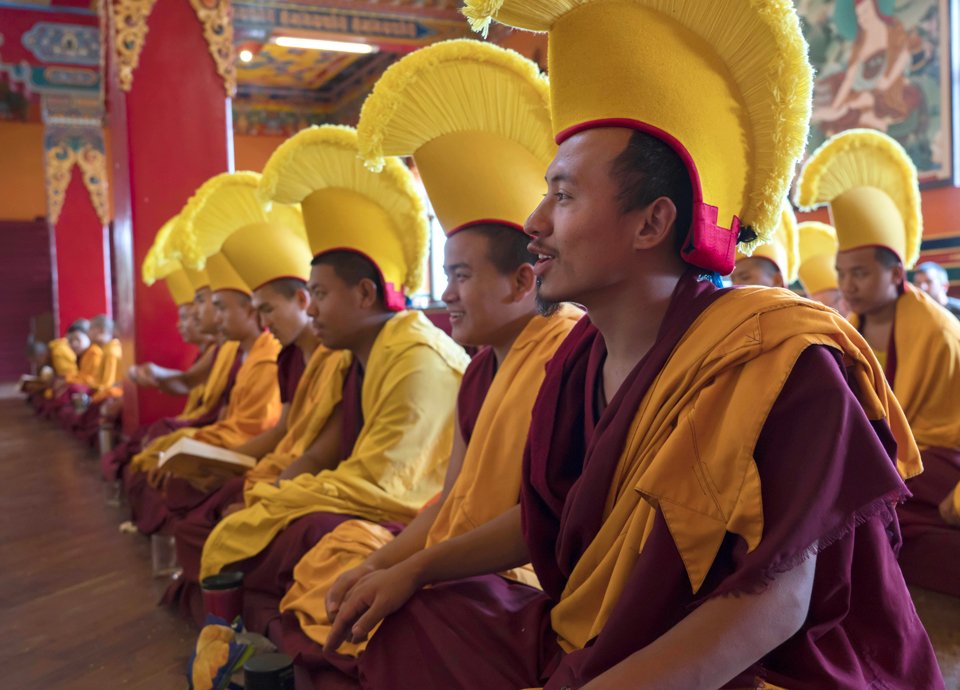
Kopan monks doing Lama Chopa on Saka Dawa at Kopan Monastery, Nepal, June 2020. Photo by Ven. Lobsang Sherab.
Lama Zopa Rinpoche continues his video teachings from Kopan Monastery in Nepal. Here is a summary of the most recent teaching:
This video begins with Ven. Thubten Samphel, discussing his early life, how he became one of the first monks of Lawudo Gompa and Kopan Monastery, and what daily life was like at these places in the beginning.
Lama Zopa Rinpoche begins this teaching explaining that we can have victory over this virus, if we contract it, by utilizing it on the path to enlightenment. This virus is just one of the shortcomings of samsara and can be used to benefit even the tiniest sentient beings. You can use the virus to not only bring temporary happiness to others, but to free them from oceans of samsaric suffering and then bring them to total cessation of obscurations and completion of realizations. The virus is just one example—you can use any problem, any relationship, any circumstance, to benefit others.
This precious human rebirth is so precious because we can use it to generate loving-kindness. This is more meaningful than living life under the control of distraction and attachment. You receive skies of merit meditating on immeasurable loving-kindness. From the four immeasurable thoughts:
How wonderful it would be if all sentient beings were to have happiness and the causes of happiness.
May they have happiness and its causes.
I myself will cause them to have happiness and its causes.
Please, Guru-Deity, bless me to be able to do this.
Making innumerable offerings to all the buddhas, or offering three hundred different food items every day, does not compare to generating loving-kindness toward sentient beings for even a few seconds. Cherishing sentient beings as precious, holding them as extremely dear, is loving-kindness.
If someone harms us, our solution is usually to harm them back. Because of this, we continuously receive harm. Therefore, if we are harmed, do not harm back. The self-cherishing thought that says, “I am the most important. My happiness is most important,” is a total hallucination. It is like drinking poison, thinking it is nectar.
Buddha defeated a million maras by meditating on loving-kindness. If you practice loving-kindness, if you practice bodhichitta, this is the best protection from life’s dangers.
Rinpoche discusses Nagarjuna’s benefits of generating loving-kindness, which include: devas and humans will love you; devas and humans will protect you; you will have happiness of mind and many happinesses; you won’t be harmed by poison and weapons; without effort you will achieve success; and you will be born in the world of Brahma.
The merit of practicing each of the four immeasurable thoughts cannot fit into universes equaling the number of grains of sand in the Ganges River. The four immeasurable thoughts are immeasurable equanimity, immeasurable loving kindness, immeasurable compassion, and immeasurable joy. Meditate on the four immeasurable thoughts, but don’t do them thinking of eating pizza or going to the beach. Especially if you meditate with tonglen, this is amazing.
Rinpoche ends this teaching discussing the benefits of the Sutra of Great Liberation and continues to offer the oral transmission of it.
We invite you to go deeper into the topics presented here, plus many others, by watching Rinpoche’s video and reading the full transcript of Rinpoche’s teaching.
Watch Lama Zopa Rinpoche’s teaching “This Perfect Human Rebirth Is So Precious Because You Can Use It to Generate Loving Kindness”:
https://youtu.be/lRS0-0HcRJw
- Read the transcript of Rinpoche’s teaching
- The four immeasurable thoughts are recited in many practices. You can find them in Daily Prayers.
- Dedication verses for COVID-19 Crisis Teachings
Find more advice and video teachings by Lama Zopa Rinpoche from Kopan Monastery and also links to videos in translation, transcripts, MP3s, and more:
https://fpmt.org/fpmt/announcements/resources-for-coronavirus-pandemic/advice-from-lama-zopa-rinpoche-for-coronavirus/
Practice advice from our teachers, Dharma study-from-home opportunities, and more can be found on the page “Resources for the Coronavirus Pandemic.”
Lama Zopa Rinpoche is the spiritual director of the Foundation for the Preservation of Mahayana Tradition (FPMT), a Tibetan Buddhist organization dedicated to the transmission of the Mahayana Buddhist tradition and values worldwide through teaching, meditation and community service.
- Tagged: advice from lama zopa rinpoche, coronavirus, covid-19, lama zopa rinpoche thought transformation video teaching, loving kindness, oral transmission, sutra of great liberation, ven. thubten samphel, video
20
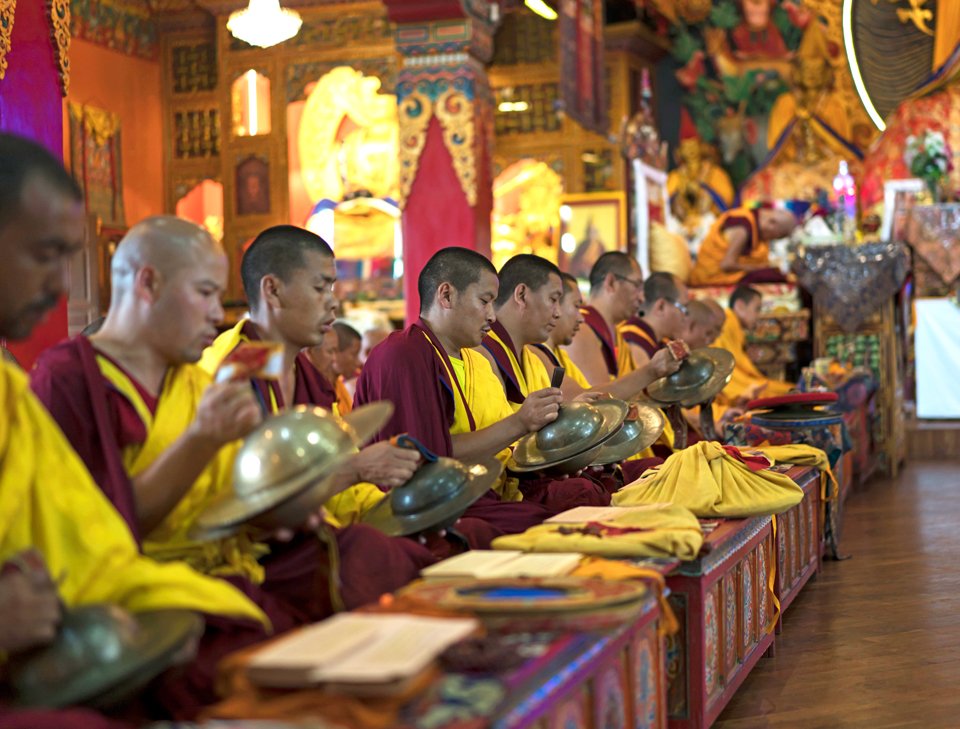
Most Secret Hayagriva Tsog Kong offered for Lama Zopa Rinpoche’s long life, Kopan Monastery, Nepal, June 2020. Photo by Ven. Lobsang Sherab.
Lama Zopa Rinpoche continues his video teachings from Kopan Monastery in Nepal. Here is a summary of the most recent teaching:
This video starts with an introductory clip of a Losar video of Lama Zopa Rinpoche talking about a quote on the benefits and results of practicing virtue. The quote was on a card sent by His Holiness the Sakya Trichen. Rinpoche then reminds us to please enjoy our life by transforming our body, speech, and mind into virtue as much as possible.
Rinpoche begins the teaching explaining that any bad, unfavorable, or undesirable conditions can be transformed into the path to happiness—not just temporary happiness, but ultimate happiness. Bad conditions, and even the happiness you experience, can be utilized in this way. This prevents us from using our precious human life like toilet paper, a total waste.
By harming others, you will get sick, Rinpoche explains. This includes killing animals for food or for business. Seeing the suffering of animals causes us to generate compassion and reminds us to practice Dharma.
This perfect human rebirth is so precious. The purpose of this life is not just to achieve happiness, or the blissful state of peace for oneself, but to benefit others.
For example, prostrating or making offerings to a statue of Buddha creates far more merit than just seeing a statue.
Tibetans make water bowl offerings to holy object because it doesn’t cost anything and it doesn’t cause pride to arise. If an offering costs a lot of money, pride can develop rather than rejoicing. In this way, offering water can become a pure offering and you collect a lot of merit. Water is wet, so offering it helps the mind become soft, rather than selfish and hard like a rock. With a soft mind one can develop loving kindness, bodhichitta, and the ultimate good heart.
Extensive water bowl offerings are made every day at Buddha Amitabha Pure Land, Washington State, US; Kachoe Dechen Ling, Aptos, California, US; Ganden Do Ngag Shedrup Ling, Mongolia; Amitabha Buddhist Centre, Singapore; Kopan Monastery, Nepal; and elsewhere.
Offering water bowls creates far more merit than simply seeing a holy object. Instead of thinking that the offering bowls contain water, which is how it appears to the human mind, you can create even greater merit by thinking that the offering bowls contain the purest nectar, which is how the offering appears to a buddha.
In Tibet, you can put the water that has been offered into a garden or clean ground. Because it is blessed water, you can’t put it in a dirty road or somewhere unclean. However, in the West, many houses don’t have gardens. So in this case, the sink where one washes up is the only place it can go, but not in a toilet, which would be very disrespectful.
By offering flowers to holy objects this creates the cause to have a beautiful body and to have a holy body that sentient beings never get bored of seeing.
By offering incense to holy objects this creates the cause to have pure morality from life to life. Incense is usually better than offering perfume because some perfumes cause attachment to arise.
By offering light to holy objects this creates the cause to develop wisdom; it eliminates ignorance. Offering light also creates the cause to have a beautiful body. Offering light is very important because ignorance causes us to suffer in the lower realms. When you see animals, you can generate compassion. Those born in the lower realms continuously suffer and create negative karma day and night.
By offering food to holy objects this creates the cause to have a long life, an increase in enjoyments, and immortality.
By offering music to holy objects this creates the cause for millions of people to be attracted to the sound of your voice, to have perfect holy speech, and to achieve all the qualities of the holy speech.
There is no difference at all between making offerings of water, flowers, incense, light, food, music, etc. to an actual buddha and making offerings to a statue of a buddha.
We invite you to go deeper into the topics presented here, plus many others, by watching Rinpoche’s video and reading the full transcript of Rinpoche’s teaching.
Watch Lama Zopa Rinpoche’s teaching “This Perfect Human Body Is So Precious Because You Can Use It to Make Offerings“:
https://youtu.be/ZUzLwDX6Ndk
- Read the transcript of Rinpoche’s teaching
- Resources on Holy Objects
- Dedication verses for COVID-19 Crisis Teachings
Find more advice and video teachings by Lama Zopa Rinpoche from Kopan Monastery and also links to videos in translation, transcripts, MP3s, and more:
https://fpmt.org/fpmt/announcements/resources-for-coronavirus-pandemic/advice-from-lama-zopa-rinpoche-for-coronavirus/
Practice advice from our teachers, Dharma study-from-home opportunities, and more can be found on the page “Resources for the Coronavirus Pandemic.”
Lama Zopa Rinpoche is the spiritual director of the Foundation for the Preservation of Mahayana Tradition (FPMT), a Tibetan Buddhist organization dedicated to the transmission of the Mahayana Buddhist tradition and values worldwide through teaching, meditation and community service.
- Tagged: advice from lama zopa rinpoche, coronavirus, covid-19, holy object, lama zopa rinpoche thought transformation video teaching, offering, video, water bowl offering
18
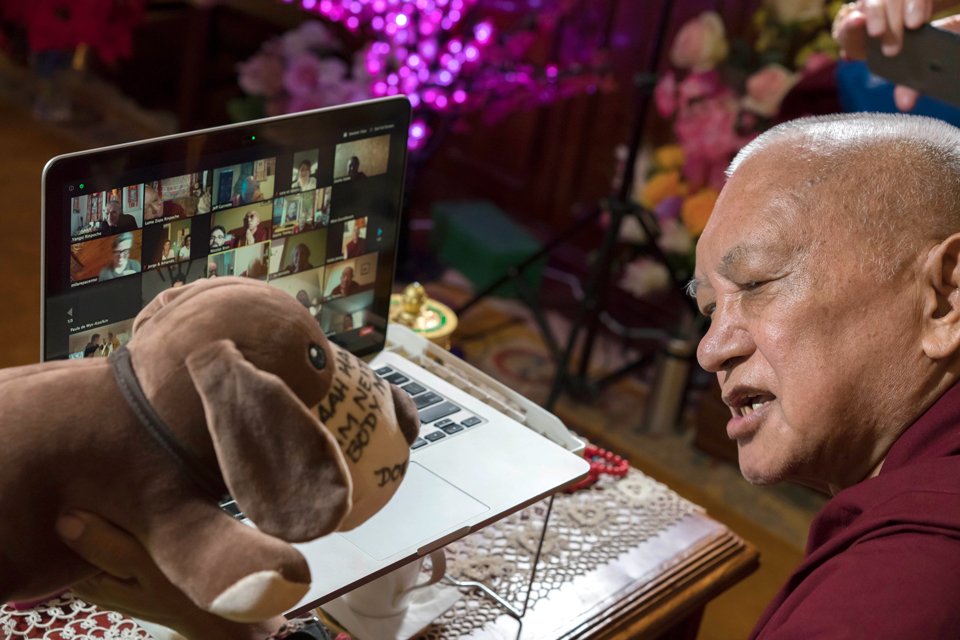
Lama Zopa Rinpoche on a Zoom call with many FPMT resident geshes, center directors, national and regional coordinates, and other staff, on Saka Dawa, Kopan Monastery, Nepal, June 2020. Photo by Ven. Lobsang Sherab.
Lama Zopa Rinpoche continues his video teachings from Kopan Monastery in Nepal. Here is a summary of the most recent teaching:
This teaching begins with video of an online “Zoom” mandala offering to Lama Zopa Rinpoche from many of the FPMT resident geshes, center directors, national and regional coordinators, and other staff. The offering was made on Saka Dawa and those on the video call made a heartfelt request for Rinpoche to live long and continue teaching, and also thanked Rinpoche for all he does. Rinpoche showed viewers cuddly toys on which he had written mantras and teachings about the emptiness of self. Rinpoche offered “numberless” thanks to all the people at FPMT centers, projects, and services around the world for the beneficial work they do. The offering was organized by Yangsi Rinpoche from his home in the United States and was made on behalf of the entire FPMT organization, including those not able to join the call.
Lama Zopa Rinpoche begins this teaching by reminding us that if we have the karma to get the coronavirus, it is not possible to escape it. The virus came from the mind, due to karma. Many have the mistaken view that anything that helps or harms the mind comes from outside. This view believes that the methods to stop the harm and to achieve happiness are only dealing with the outside world, while forgetting about the mind. The main work is in the mind.
It is a huge mistake believing everything in life comes from outside. Rinpoche says we should not try to retaliate against the harm we think of as coming from outside. That is only continuing to create the cause for future harm. By harming others—human beings, animals, even the tiniest creatures—you are continuously creating the cause to receive harm. You think you are doing this (harming others) for your happiness, but that is totally wrong.
The basic method to stop harm is to change your mind from a negative mind to a positive mind.
We have to understand that this human body is so important so that we take care of this body and don’t treat it like garbage.
Continuing on from Rinpoche’s last teachings, Rinpoche discusses the benefits of prostrating to holy objects, including that you create greater merit prostrating to a holy object than you do by seeing it. Because of this, it is good to have many holy objects as possible inside and outside of the home. This is why gompas and temples have so many statues—it’s a very simple way to generate merit by treating holy objects properly. Everyone who sees these holy objects in your home (even an enemy!) will leave with oceans of merit.
Think that all holy objects you see are manifestations of your root guru. Think that they manifest as a holy object to purify the negative karma that makes you be born in the lower realms, to free you from the lower realms, to free you from samsara, to free you from lower nirvana, and to bring you to enlightenment. If you think this, with your palms together in prostration mudra, and go around the holy object (circumambulate), you feel connected and don’t view them as if you were just in a museum. This is the proper way to engage with holy objects.
We invite you to go deeper into the topics presented here, plus many others, by watching Rinpoche’s video and reading the full transcript of Rinpoche’s teaching.
Watch Lama Zopa Rinpoche’s teaching “You Create Greater Merits by Prostrating to a Holy Object Than by Seeing It”:
https://youtu.be/NufyhxIa8S8
- Read the transcript of Rinpoche’s teaching
- Advice for Prostrations from Lama Zopa Rinpoche
- Resources on Holy Objects
- Dedication verses for COVID-19 Crisis Teachings
Find more advice and video teachings by Lama Zopa Rinpoche from Kopan Monastery and also links to videos in translation, transcripts, MP3s, and more:
https://fpmt.org/fpmt/announcements/resources-for-coronavirus-pandemic/advice-from-lama-zopa-rinpoche-for-coronavirus/
Practice advice from our teachers, Dharma study-from-home opportunities, and more can be found on the page “Resources for the Coronavirus Pandemic.”
Lama Zopa Rinpoche is the spiritual director of the Foundation for the Preservation of Mahayana Tradition (FPMT), a Tibetan Buddhist organization dedicated to the transmission of the Mahayana Buddhist tradition and values worldwide through teaching, meditation and community service.
- Tagged: advice from lama zopa rinpoche, coronavirus, covid-19, lama zopa rinpoche thought transformation video teaching, video
17
Lama Zopa Rinpoche often speaks about solar and lunar eclipses, which are considered auspicious for practice and provide opportunities for accumulating increased merit.
Lama Zopa Rinpoche reminds students that the merit generated is multiplied by one hundred million on solar eclipses and by seven hundred thousand on lunar eclipses, and that the multiplying effect of eclipses occurs regardless of whether the eclipse is partial or full. Also, Rinpoche advises that the merit multiplying effect does not last the whole calendar day and that merit making activities should be carried out during the time of the eclipse itself.
Whether or not an eclipse is visible and its local timing depends on where a student is on Earth. Websites like timeanddate.com can help students determine when there is an opportunity to practice during an eclipse.
Upcoming solar eclipse: June 21, 2020 (This eclipse is at its maximum at 6:41 UTC.)
In November 2019, Rinpoche wrote out specific advice for eclipses:
… So what can you do on these days?
-
-
- You can rejoice in your, other sentient beings’, and the buddhas’ three times’ merits.
- You can read the Vajra Cutter Sutra, Chanting the Names of Manjushri, and King of Prayers.
- You can meditate on emptiness, and especially meditate on bodhichitta, with whichever technique.
- You can do Lama Chopa. At either the beginning of Lama Chopa or during the lamrim section, you can meditate on emptiness.
- Whatever activity they are doing at your local FPMT center, you can join them.
- Of course, you can do self-initiation—that is the best one.
- You can do prostrations by reciting the Thirty-Five Buddha prayer.
- You can make more offerings or help sentient beings more. Liberate animals or, with bodhichitta, practice charity to people or animals—you can do whatever you can.
- Recite OṂ MAṆI PADME HŪṂ with bodhichitta.
- Of course, don’t forget that the best practice is bodhichitta, tonglen.
-
Keep this advice, especially in order to educate and help others, the numberless sentient beings ….
Any other meritorious activities advised by Lama Zopa Rinpoche are also good to do on solar eclipses. In the video “Advice for Saka Dawa Duchen,” Rinpoche discusses additional ideas for virtuous activities to complete when merit is multiplied, such as during solar eclipses, as well as the source of Rinpoche’s knowledge about the merit multiplying effects of certain days throughout the year:
To learn more about merit multiplying days, watch “Advice for Saka Dawa Duchen” on YouTube and find a transcript of the video on FPMT.org:
https://youtu.be/xYWCFIwZgTk
You can read more about practices specifically recommended by Rinpoche for solar and lunar eclipses, and other merit multiplying days:
https://fpmt.org/teachers/zopa/advice/practice-on-the-four-great-holy-days/
Check “Dharma Practice Dates” for information on auspicious days for practice:
https://fpmt.org/media/resources/dharma-dates/
Acquire your own copy of the Liberation Prison Project calendar through the Foundation Store:
https://shop.fpmt.org/2020-Liberation-Tibetan-Calendar-PDF-Dowloadable-Format-_p_3252.html
Through comprehensive study programs, practice materials, and training seminars, FPMT Education nourishes the development of compassion, wisdom, kindness, and true happiness in individuals of all ages.
- Tagged: eclipse, merit multiplying day
- Home
- News/Media
- Study & Practice
- About FPMT Education Services
- Latest News
- Programs
- New to Buddhism?
- Buddhist Mind Science: Activating Your Potential
- Heart Advice for Death and Dying
- Discovering Buddhism
- Living in the Path
- Exploring Buddhism
- FPMT Basic Program
- FPMT Masters Program
- FPMT In-Depth Meditation Training
- Maitripa College
- Lotsawa Rinchen Zangpo Translator Program
- Universal Education for Compassion & Wisdom
- Online Learning Center
- Prayers & Practice Materials
- Overview of Prayers & Practices
- Full Catalogue of Prayers & Practice Materials
- Explore Popular Topics
- Benefiting Animals
- Chenrezig Resources
- Death & Dying Resources
- Lama Chopa (Guru Puja)
- Lama Zopa Rinpoche: Compendium of Precious Instructions
- Lama Zopa Rinpoche: Life Practice Advice
- Lama Zopa Rinpoche Practice Series
- Lamrim Resources
- Mantras
- Prayer Book Updates
- Purification Practices
- Sutras
- Thought Transformation (Lojong)
- Audio Materials
- Dharma Dates – Tibetan Calendar
- Translation Services
- Publishing Services
- Teachings and Advice
- Find Teachings and Advice
- Lama Zopa Rinpoche Advice Page
- Lama Zopa Rinpoche: Compendium of Precious Instructions
- Lama Zopa Rinpoche Video Teachings
- ༧སྐྱབས་རྗེ་བཟོད་པ་རིན་པོ་ཆེ་མཆོག་ནས་སྩལ་བའི་བཀའ་སློབ་བརྙན་འཕྲིན།
- Podcasts
- Lama Yeshe Wisdom Archive
- Buddhism FAQ
- Dharma for Young People
- Resources on Holy Objects
- Ways to Offer Support
- Centers
- Affiliates Area
- Teachers
- Projects
- Charitable Projects
- Make a Donation
- Applying for Grants
- News about Projects
- Other Projects within FPMT
- Support International Office
- Projects Photo Galleries
- Give Where Most Needed
- FPMT
- Shop
Translate*
*powered by Google TranslateTranslation of pages on fpmt.org is performed by Google Translate, a third party service which FPMT has no control over. The service provides automated computer translations that are only an approximation of the websites' original content. The translations should not be considered exact and only used as a rough guide.The most happy thing in my life, most fulfilling thing is to work for and to benefit sentient beings. Even just the mere thought to cause happiness to sentient beings, to benefit them, to free them from suffering is the BEST offering to all the buddhas and bodhisattvas. This is the best offering, the best puja; this is what pleases their holy mind most.







